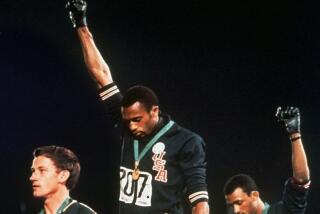THE BEN JOHNSON STEROID INQUIRY : Moses’ Emotions Mixed; Vindication the Strongest One
- Share via
Wednesday’s events in Toronto left Edwin Moses, longtime track star and anti-steroid crusader, with mixed emotions.
There was the positive feeling that the testimony of Charlie Francis, coach of banned Olympian Ben Johnson, would be a major deterrent to those track and field athletes who believe that the only way to excel is to get a boost from chemicals.
There was sadness over the implication by Francis of his longtime friend and sprinter, Evelyn Ashford, in past drug usage, an implication that Moses said he just flat didn’t believe.
There was a burning desire to refute Francis’ main premise: that an athlete can no longer compete on the highest level without help from drugs.
And there was a feeling of vindication that comes to somebody who has been predicting for years what Francis publicly admitted Wednesday. “Yes, for me, I can now say that,” Moses said. “I can say, ‘I told you so.’ I started this six years ago. I didn’t just jump in last year or the last couple of years. I didn’t just get on the bandwagon when it was fashionable. I’ve had a longtime involvement in this, and I’ve been serious about it every step of the way.”
Moses’ public campaign against the use of performance-enhancing drugs in track and field began in 1983, when he was interviewed by the New York Post before an indoor track meet. He told the reporter much about his suspicions that more and more athletes were taking the drugs, that the danger was increasing and that a scandal was brewing that, someday, could take on monumental proportions.
The New York Post made huge headlines of that, but most of Moses’ peers shrugged it off or denied it. Five years later, after Johnson had run an unbelievably fast 9.79-second 100 meters for the gold medal in Seoul and two days later had it stripped from him when he tested positive for steroids, Moses had a measure of his proof.
But even then, many of the denials of the main players in the drama muddied the waters. Wednesday, when Francis said that it was so, that his star sprinter had been a longtime steroid user, Moses could stand up, look his detractors in the eye and give a knowing nod.
But that was only part of what he said he felt when he heard the broadcast of the news Wednesday.
“Partly, I was happy when I heard,” he said. “I think, long range, that this will decrease drug usage. I think a lot of athletes will be more wary. And I think that a lot of them will start to realize that technology, the people in the labs, are well ahead now.”
He said that he wasn’t sure that Francis’ method of testimony--not naming names, but implicating specific people by identifying enough about them and their achievements to make it obvious--was the best way.
“The thing about Evelyn, well, that’s just not the Evelyn Ashford I know. I don’t know what kind of anecdotal information he has, but I just don’t believe that one.”
Moses also took issue with the stance by Francis that said that he gave his athletes their choice to take drugs, but pretty much told them that, without that, they wouldn’t be able to stay with the others in the sport’s fast lanes.
“I challenge guys like Charlie Francis who say that,” Moses said. “That’s simply not so. That’s a cop-out. I think I’m proof of that. I won without using steroids. In fact, I won pretty regularly from 1976 to 1989.”
Moses, in one span of nine years, nine months and nine days, won 107 consecutive races, plus 15 preliminary heats. He won the gold medal in his 400-meter hurdle specialty in the ’84 L.A. Olympics in the midst of his unprecedented streak. “I represent lots of athletes who would rather lose than take steroids to win,” he said.
The sad thing, Moses admitted, was that, in recent years, the numbers of those who believed as he did was dwindling. At least until Ben Johnson in Seoul and Charlie Francis in Toronto.
But then, Edwin Moses told us so. Six years ago.
More to Read
Go beyond the scoreboard
Get the latest on L.A.'s teams in the daily Sports Report newsletter.
You may occasionally receive promotional content from the Los Angeles Times.







